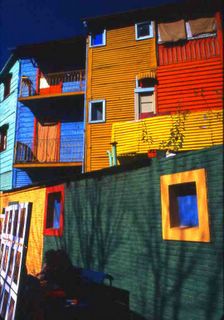Buenos Aires, meatpacking central and major exporter of beef to Europe, was once called "Nuevo Chicago." Its colorful Barrio La Boca (photo), built hard by the port, was settled by Italian immigrants who worked in the area's warehouses and meatpacking plants.

Our young Buenos Aires guide, Gaston McKay ("It’s mc-HIGH, like in Scotland"), joked about Argentines' European lineage: "In Mexico, they descend from Aztecs. In Peru, they descend from Incas. In Argentina, we descend from ships."
During a long ride out to the pampas, Gaston revealed some of his countrymen's interesting foibles and habits:
"Other Latin Americans think Argentines are arrogant, frivolous and insecure.
"Arrogant because we are proud of our European descent and are always Europe-looking.
"Frivolous because of our plastic surgery. Buenos Aires is a plastic surgery leader. Frivolous, too, because of our feverish rush around October to get in shape for summer. Come October, everyone runs to the parks. And we might skip a meal – that’s our Ramadan.
"Insecure because we don’t know who we are. We need cafes so we can talk to others and tell them our problems. We’re all in therapy. There's a section of Buenos Aires that's full of therapists, so we call it 'Village Freud.' We’re the third largest market for Woody Allen films, after the US and France."
As we drove past Pilar, a gated community on the Pan-American Highway about 40 miles outside the capital, Gaston told us that "it used to be that people lived in the city and had a house in the country. Now, more people are living in the country and commuting into the city for work, especially people with kids. In summer, we are always looking for a pool, so if you have a friend who lives in one of these private communities with a pool, he is your best friend in the summer."
And Argentines make friends over mate (MAH-tay), an herb that flavors coffee and tea. As we traveled through the country, I noticed more hands with mate gourds and metal sipping straws than hands without. As ubiquitous as umbrellas in London.
"We take our mate gourds everywhere," confirmed Gaston. "At the beach, at the office. Mate means not only tea, but companionship. It means something if you’re going to share your mate. If someone invites you to have a mate, it means they consider you a friend."
Gaston shared other Argentine gustatory habits: "Argentines used to eat 100 kilos of beef per person per year. A whole cow. We're trying to get healthier, so now we eat only half a cow. We're trying to eat more fish and vegetables. But we miss our beef, our asado -- barbecue. We reduce the cholesterol in the beef by drinking wine.
"Meat with wine is good for you. Meat with no wine is not so good."
(I posted a version of this story some 20 months ago. This week, I got an e-mail from a woman named Gail who found that old post and wrote to tell me she'd had Gaston as her guide when she was in Argentina. She'd kept in touch with him and will be seeing him in April when she returns to South America for an Amazon cruise. Gaston as guide will add much to her journey, I'm sure. He is truly wonderful. And cute -- when Gaston left us at the departure gate for our flight from Buenos Aires to Bariloche in Patagonia, where we'd meet a new guide, all the women gave Gaston big hugs. We traveled to Argentina with SmarTours, an outstanding operator that delivers great value for your travel buck. In our very well-traveled group were many people who'd been on a half dozen or more SmarTours trips. I've got my eye on their Vietnam-Cambodia itinerary... Check them out, and if you travel with them to South America and meet Gaston McKay, give him my best.)
www.LoriHein.com
